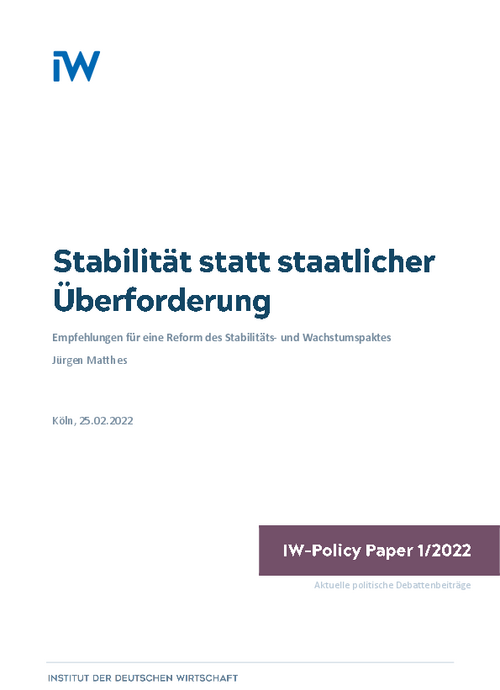Contrary to what the German government seems to be aiming for, a reform of the Stability and Growth Pact (SGP) is necessary. The debt reduction rule forces highly indebted euro countries to reduce their debt too quickly and too damagingly for growth.

Stability instead of government overreach

Contrary to what the German government seems to be aiming for, a reform of the Stability and Growth Pact (SGP) is necessary. The debt reduction rule forces highly indebted euro countries to reduce their debt too quickly and too damagingly for growth.
Relying only on the flexibility of the pact would overextend exception options of the SGP. Moreover, it would make it impossible for the European Commission to play its intended role as guardian of the treaties. “Brussels” would thus be further weakened. The following reform steps are recommended: The 60 per cent of GDP threshold for government debt should be maintained, but it should be possible to stretch the debt reduction rule beyond the 20-year horizon if there is an unavoidable need. The 3-per-cent deficit criterion should also be retained because of its signalling effect. By contrast, the structural deficit target should be (largely) replaced by a new medium-term expenditure rule due to measurement problems. Green-golden rules, i.e. exemptions from the deficit rules especially for green investments, should be viewed critically for various reasons. Fines for violations should be retained, but should be supplemented by milder and more easily applicable sanctions to a larger extent as currently.
In the debate on the SGP, there are repeated calls to soften the pact and create generous rules for diverse investment-related government spending. But this discussion cannot be conducted in isolation from the challenges of this decade. Hence, the core thesis of this study is that a functional SGP is essential because the EU is at risk of government overstretch and strategic overextension at the expense of financial stability. The EU is running into a trade-off between its high ambitions (in terms of decarbonisation, digitisation, and strategic autonomy) and their ability to be financed in a way that is consistent with preserving stability in highly indebted states. While this mainly concerns the vulnerable euro countries, the euro debt crisis teaches that contagion effects of a sovereign debt crisis could ultimately endanger the entire EMU. If such a crisis were to occur, the EU could largely write off its ambitious goals. The weakest link in the chain determines its resilience. Therefore, securing stability must have top priority – and be underpinned by a reformed SGP as an anchor of confidence. Ever higher demands on the state, which are arising everywhere, must be subordinated to this.
Stability risks loom above all because the Corona crisis has greatly increased debt levels and continues to have a dampening effect. In addition, the ECB will have to exit from its ultra-expansive monetary policy and from government bond purchases due to higher inflation, which will likely create unrest on the financial markets. What is more, the four major trends of this decade further increase the risks to debt sustainability in the highly indebted euro countries in this decade. Demographics, decarbonisation, digitisation, and “de-globalisation” (in the form of protectionism, reshoring, and a new industrial policy to increase the strategic autonomy of the EU) increase government spending and tend to have negative growth effects when taken together. Demographic trends in particular will dampen growth significantly. The green transformation has at best marginally positive growth effects, but also negative ones cannot be ruled out: Although climate-friendly investments have a positive effect, value added and investment in more climate-damaging areas are likely to shrink or at least grow much more weakly. The basically positive growth effects of digitisation have hardly materialised to date. And the effects of the various facets of “de-globalisation” can at best have a positive impact in the short term, but will dampen productivity developments in the medium term because specialisation advantages will be lost. In addition, the real interest rate could rise due to higher investment activity, thus further jeopardising debt sustainability and weakening the argument in favour of government investment spending in the low-interest environment.

Stability instead of government overreach

More on the topic
Not so Different?: Dependency of the German and Italian Industry on China Intermediate Inputs
On average the German and Italian industry display a very similar intermediate input dependence on China, whether accounting for domestic inputs or not.
IW
China’s Trade Surplus – Implications for the World and for Europe
China’s merchandise trade surplus has reached an all-time high and is likely to rise further. A key driver appears to be a policy push to further bolster Chinese domestic manufacturing production, implying the danger of significant overcapacities.
IW